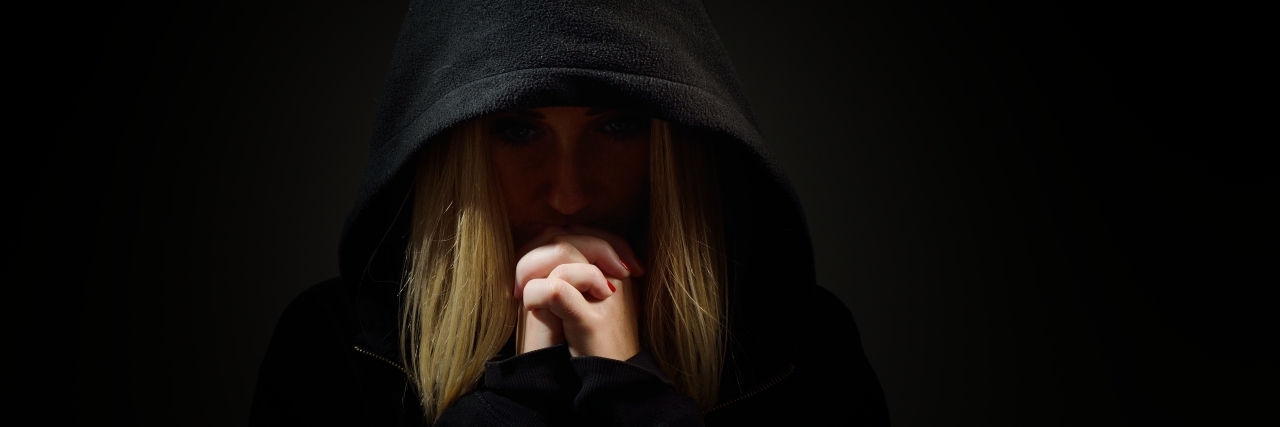My mother struggled with schizoaffective disorder. Her delusions most often manifested in a religious, specifically Christian, form. She was raised Catholic, but never attended church after her childhood. One of the telltale signs of her becoming unwell was a sudden obsession with biblical scripture and church services. She furiously underlined random bible passages, claiming that she had revelations from God, sometimes believing she was the messiah. I was young and having complete trust and faith in her, I believed her. I didn’t tell anyone about her behavior and there was nobody around to explain to me that it was a symptom of her psychosis. Even when I entered my teen years and veered toward an agnostic perspective, when she was in the throes of her delusions, I could see the truth in her eyes. There was no remnant of doubt in her mind that her experiences were true. Her beliefs were so strong and my love for her so pure, I often wondered if there was more substance to her experiences beyond a mere symptom of illness.
When she died by suicide when I was 17 years old, I aggressively rejected the possibility of God. In retrospect, it was a very common reaction for someone to have after experiencing a loss of that magnitude. If there were a God, why would they allow that to happen? Why would they allow such a kindhearted, caring woman to be so tortured to the point that she ended her life because she was unable to cope?
• What is Bipolar disorder?
I was diagnosed with bipolar disorder in the autumn following my mother’s death. My manic episodes generally consisted of drug abuse, promiscuous sex and other types of reckless behavior. Last year was the first time my mania led to full blown psychosis. In my psychosis, I experienced a few symptoms that were very similar to my mother’s. I often heard what I believed was the voice of God. I believed I was Jesus Christ incarnate. I believed the apocalypse was imminent. I saw “God” in everything. It was a spiritual awakening, in a sense. Unfortunately, it was accompanied by paranoid delusions and grandiose thinking.
I cut ties with my best friend because I believed she was an evil alien. I started buying into the same conspiracy theories that I had always scoffed at in my devout skepticism. I started smudging my apartment with sage, meditating with crystals and communicating with “spirits.” In the span of a couple weeks, I transformed from a skeptical atheist to a spiritual fanatic, seeing significance and synchronicity in even minutiae. It understandably alarmed everyone close to me. Anyone who opposed me, I believed was evil or under “Illuminati” influence. The most frightening thing about my psychosis is that regardless of what anybody told me, I believed my reality was the only truth. There was no reasoning with me in the midst of psychosis. And I don’t think you can understand it unless you’ve experienced it.
After my mania passed and I inevitably crashed, I abandoned spirituality and tried my damnedest to forget about all of my experiences the few months prior. I was unable to distinguish between what was real and not.
Flash forward to many months later and anytime any topic related to spirituality arose, I became frightened and uncomfortable. I had no desire to revisit or explore it in any way. Until about a week ago. I felt an urge to reacquaint myself with astrology. I suddenly desired tarot cards, seemingly out of the blue. And this desire terrified me. I assessed whether I was hypomanic and decidedly was not. It was time to revisit my spirituality in a gentle, slightly apprehensive way.
I am nervous about certain people around me growing concerned as I explore this. In my more balanced state, I believe that spirituality should be more of a private practice than an overtly public one as it had been during psychosis. There absolutely remains palpable hesitance in my egoic mind. I am choosing to finally face my fears in this life, as I think it’s imperative to my growth as a human.
If you or someone you know needs help, visit our suicide prevention resources page.
If you need support right now, call the National Suicide Prevention Lifeline at 1-800-273-8255, the Trevor Project at 1-866-488-7386 or reach the Crisis Text Line by texting “START” to 741741.
Getty image via itsmejust

